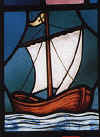- Saved?
- Luke
13:22-14:35
- Dec.28
"Another
new group has come to our
area, attracting scores of
disaffected members of other
churches. The leaders have
convinced them that they alone
have the right interpretation
of “who are really saved.”
People in Jesus’ day also
wanted to be sure about
salvation. They asked the
question in different
ways—”What must I do to
inherit eternal life?”
“How can a man be born again
to enter the kingdom of
God?” “Who then can be
saved?” Even secular people
ask, “Which life goal is
right?” No matter the form,
it is still an essential
question for anyone to ask.
1. Which form of this basic
question has expressed your
own searching?
2. Read Luke 13:22-35.
Luke’s repeating that Jesus
is journeying to Jerusalem
gives the setting of our title
question (vv. 22-23). What in
Jesus’ parable answer would
startle his Jewish listeners
or perhaps you?
3. Based on this parable, how
would you respond to a
skeptic’s criticism that
God’s conditions for
salvation are too narrow?
4. The Pharisees’ motive for
warning Jesus is not clear.
They are now allied with the
Herodians, their political
enemies, against Jesus. But he
is fearless (vv. 31-33). Then
he expresses another emotion.
Why do you think Jesus is so
deeply passionate about
Jerusalem?
5. Read Luke 14:1-24. What
explains the Pharisees’
double silence to Jesus’
questions (vv. 4, 6)?
6. The Pharisees have been
watching Jesus at this dinner
party. But he also has been
observing them! So with two
parables he teaches the guests
about true honor (vv. 7-11)
and his host about true
hospitality (vv. 12-14). How
should Jesus’ lessons affect
your social life?
7. But these two parables also
lead up to the one on the
Great Messianic Banquet (vv.
15-24). How does this third
parable climax Jesus’ answer
to our study question of who
ultimately will be saved?
8. Read Luke 14:25-35. From
addressing national leaders
Jesus now turns to the growing
crowds. First, he lays down
his conditions for
discipleship by calling into
question powerful
loyalties—to family and to
self. What would be a
contemporary example of
Christians “hating” their
family?
9. Travelers nearing Jerusalem
passed old wooden crosses
along the way. Everyone knew
their use—for criminal
execution. So how would
Jesus’ fellow travellers
understand his words in verse
27?
10. Second, he tells the crowd
to count the cost of
discipleship (vv. 28-33). The
two parables seem to make the
same point about this. But in
the second parable how is
Jesus’ challenge different?
Try counting the cost of not
following Jesus on his terms.
What to you is most sobering?
|

